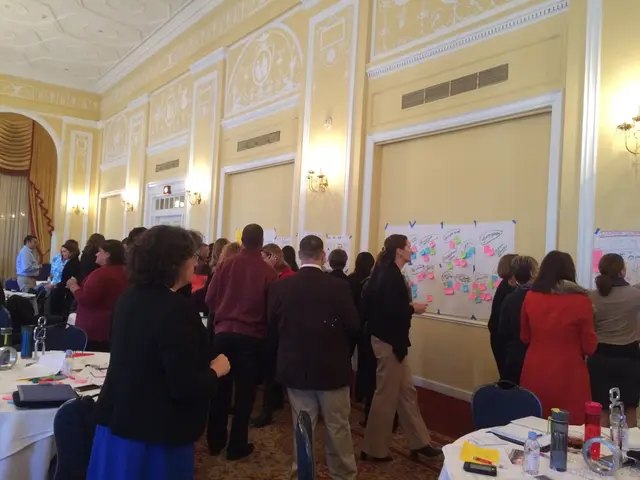Young People's Ambitions: A Double-Edged Sword in Countries with High Income Inequality
In nations with substantial wealth disparities, youth are more inclined to hold optimistic views regarding social mobility.
Young adults in nations like Albania, Jamaica, and Kazakhstan are more optimistic about their future prospects than their peers in countries like France and South Korea - a finding backed by a recent study. However, this optimism can mask underlying risks too.
In many countries, such as Germany, income disparities are growing, and the rich are getting richer while the poor struggle. This expanding wealth gap is now hindering social mobility, according to authors Francesca Borgonovi of the University College London and the OECD Centre for Skills, as well as Artur Pokropek of the Educational Research Institute in Warsaw, in their article published in the journal "Science."
The Great Gatsby Curve: Hope Versus Reality
This pattern, where social mobility is generally lower in countries with greater inequality, is known as the Great Gatsby Curve. However, it's interesting to note that young people's expectations of future advancement are highest in countries where income disparities are more noticeable, as evidenced by data from the PISA study. For example, 40% of 15-year-olds from lower-income backgrounds in countries such as Albania, Kazakhstan, and Romania anticipate reaching a much higher status later in life. On the flip side, only 18% of similar youth in South Korea, 20% in Malaysia, and 22% in France expect the same. Across all 57 countries surveyed, the majority of 15-year-olds expect to rise above their parents' socio-economic status.
The Paradox of Opportunity
In economies experiencing sustained growth, this heightened optimism doesn't necessarily pose a problem, as many young people still find avenues for upward mobility. However, the authors warn that while the economy booms, young people may struggle to discern whether their advancement hinges on merit, hard work, and talent or undeserved advantages. Their aspirations may be influenced by widespread success narratives that don’t align with the actual opportunities for upward mobility.
Growing Inequality: A Threat to Social Cohesion
While sustained economic growth may help maintain social cohesion during periods of rising inequality, the economic landscape is changing. As expectations go unfulfilled, this can lead to reduced well-being, lower trust in institutions, reduced civic engagement, and even political unrest. In a world where the rich get richer, the consequences of unmet expectations can be disastrous.
Sources: ntv.de, kst/dpa, World Health Organization (WHO), UNICEF, International Labor Organization (ILO)
- Youth
- Inequality
- Economy
Enrichment Data:
Overall:
Youth in countries with high income inequality may have higher expectations for advancement due to several factors:
- Perceived Opportunities: In rapidly developing economies, individuals often have high expectations for their future income due to observing others achieving success, a phenomenon known as the "tunnel effect."
- Competition and Aspiration: In societies with significant income gaps, there may be a stronger culture of competition and aspiration. Youth may perceive income inequality as an opportunity to climb the social ladder.
Potential Risks:
Despite those aspirations, there are potential risks associated with this phenomenon:
- Disillusionment and Demotivation: If opportunities do not materialize as expected, youth may face disillusionment and decreased motivation. The gap between expectations and reality can lead to reduced confidence in social and economic systems.
- Social Division: High income inequality can intensify social divisions, with those who benefit from the system limiting access to resources for others, reinforcing class stratification.
- Erosion of Social Cohesion: Over time, persistent inequality can fuel social unrest and erode trust in democratic institutions, leading to disenchantment with the political and economic systems.
- Mismatch Between Aspirations and Outcomes: Ambitious aspirations for advancement can lead to over-investment in education or other strategies without corresponding gains, resulting in disappointment and frustration.
- The optimism of young adults in countries with high income inequality, such as Albania, Jamaica, and Kazakhstan, can often be misleading, masking the risks that come with growing economic disparities.
- In nations where income differences are more pronounced, youth from lower-income backgrounds, like those in Albania, Kazakhstan, and Romania, have a higher expectation of reaching a much higher social status, in contrast to their counterparts in South Korea, Malaysia, and France.
- In economies seeing sustained growth, young people's unwavering ambition for upward mobility presents a paradox, as they may struggle to differentiate between merit-based success and undeserved advantages in a landscape shaped by the wealthy getting wealthier.
- As income inequality continues to rise, it poses a threat to social cohesion, potentially leading to reduced well-being, lower trust in institutions, decreased civic engagement, and even political unrest.
- Enrichment efforts should focus on providing young people with accurate insights into the opportunities and challenges of their respective economies, fostering personal growth, education-and-self-development, and mental-health while helping them navigate through their ambitious hopes and aspirations.







